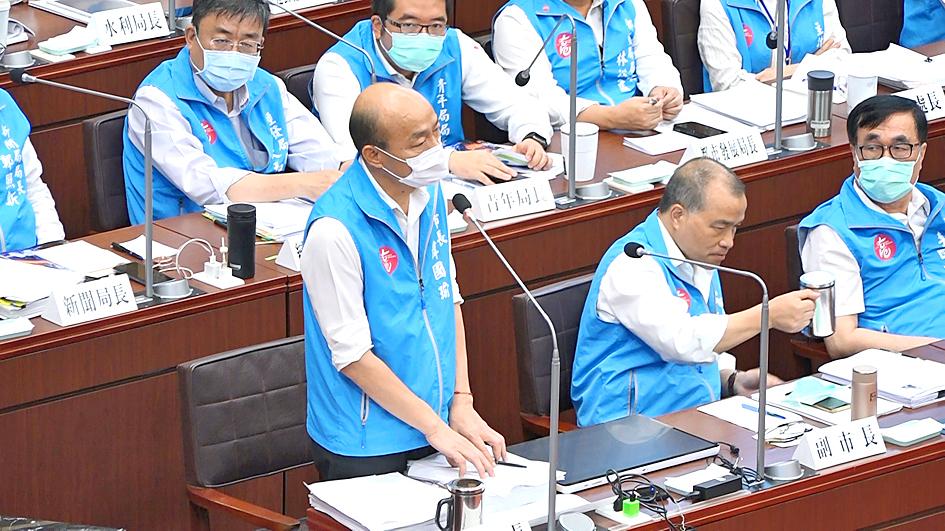Kaohsiung Mayor Han Kuo-yu (韓國瑜) at a city council session yesterday apologized for taking three months off last year to campaign for January’s presidential election.
Han said that he was now prioritizing municipal affairs and was focused primarily on preventing the spread of COVID-19.
He was “doing two days’ work each day” to make up for time lost, he said.

Photo: Lee Hui-chou, Taipei Times
Han on May 5 attended a city council session for the first time in 201 days, giving a report on pandemic response measures.
At yesterday’s session, Han said the Kaohsiung City Government would be injecting NT$50 million (US$1.67 million) into the city’s economy to revitalize it, and that a cross-departmental team had been formed to handle the city’s response measures.
The city government would also tap into natural disaster reserve funds to procure supplies, he said.
Separately, Han listed his achievements, saying that since he took office the city’s agricultural exports had increased, tourism to the city was up, and progress had been made on tackling water and air pollution.
There were also improvements to English-language education and meal subsidies for children from disadvantaged families, he said.
The city government was now aiming to improve the economy, move forward with construction projects and connect Kaohsiung with the international community, he said.
With regards to the economy, Han reiterated his proposed “Love Ferris wheel” and shopping mall project, and said that it was “regrettable” that the Ministry of Transportation and Communications, which controls the site proposed for the project, had not yet given its approval.
The city government also plans to offer bursaries of NT$20,000 each to 100 outstanding Kaohsiung college students each year to help them study abroad, he said, adding that the names of the selected students would be announced in September.
Han said that he was “very sorry” for taking three months off while campaigning last year, but that he and the city government had been making up for it by working hard over the past three months so that residents could “live in peace and work happily.”
In response, Wecare Kaohsiung founder Aaron Yin (尹立) called Han’s apology “crocodile tears,” and urged city residents not to “be tricked again.”
Separately, in a statement issued yesterday the Taiwan Statebuilding Party said that while Han “apologized for taking leave,” he was “not apologizing to the city’s residents.”
The motivation for the apology was that Han had seen the results of a public survey, which found that residents were upset about Han taking leave from his duties to campaign, and that 45 percent of residents were in favor of a recall, the party said.
Han apologized in an attempt to avoid the recall, it added.
Meanwhile, former Chinese Nationalist Party chairman Eric Chu (朱立倫) said he believed the city’s residents would give Han another chance as long as “he worked hard on fighting the spread of COVID-19 and revitalizing the economy.”

The Grand Hotel Taipei on Saturday confirmed that its information system had been illegally accessed and expressed its deepest apologies for the concern it has caused its customers, adding that the issue is being investigated by the Ministry of Justice Investigation Bureau. The hotel said that on Tuesday last week, it had discovered an external illegal intrusion into its information system. An initial digital forensic investigation confirmed that parts of the system had been accessed, it said, adding that the possibility that some customer data were stolen and leaked could not be ruled out. The actual scope and content of the affected data

‘LIKE-MINDED PARTNER’: Tako van Popta said it would be inappropriate to delay signing the deal with Taiwan because of China, adding he would promote the issue Canadian senators have stressed Taiwan’s importance for international trade and expressed enthusiasm for ensuring the Taiwan-Canada trade cooperation framework agreement is implemented this year. Representative to Canada Harry Tseng (曾厚仁) in an interview with the Central News Agency (CNA) said he was increasingly uneasy about Ottawa’s delays in signing the agreement, especially as Ottawa has warmed toward Beijing. There are “no negotiations left. Not only [is it] initialed, we have three versions of the text ready: English, French and Mandarin,” Tseng said. “That tells you how close we are to the final signature.” Tseng said that he hoped Canadian Prime Minister Mark Carney

POSITIVE DEVELOPMENT: Japan and the US are expected to hold in-depth discussions on Taiwan-related issues during the meeting next month, Japanese sources said The holding of a Japan-US leaders’ meeting ahead of US President Donald Trump’s visit to China is positive news for Taiwan, former Japan-Taiwan Exchange Association representative Hiroyasu Izumi said yesterday. After the Liberal Democratic Party’s landslide victory in Japan’s House of Representatives election, Japanese Prime Minister Sanae Takaichi is scheduled to visit the US next month, where she is to meet with Trump ahead of the US president’s planned visit to China from March 31 to April 2 for a meeting with Chinese President Xi Jinping (習近平). Japan and the US are expected to hold in-depth discussions on Taiwan-related issues during the

President William Lai (賴清德) yesterday bestowed one of Taiwan’s highest honors on Saint Vincent and the Grenadines (SVG) Ambassador Andrea Clare Bowman in recognition of her contributions to bilateral ties. “By conferring the Order of Brilliant Star with Grand Cordon on Ambassador Bowman today, I want to sincerely thank her, on behalf of the Taiwanese people, for her outstanding contribution to deepening diplomatic ties between Taiwan and SVG,” Lai said at a ceremony held at the Presidential Office in Taipei. He noted that Bowman became SVG’s first ambassador to Taiwan in 2019 and